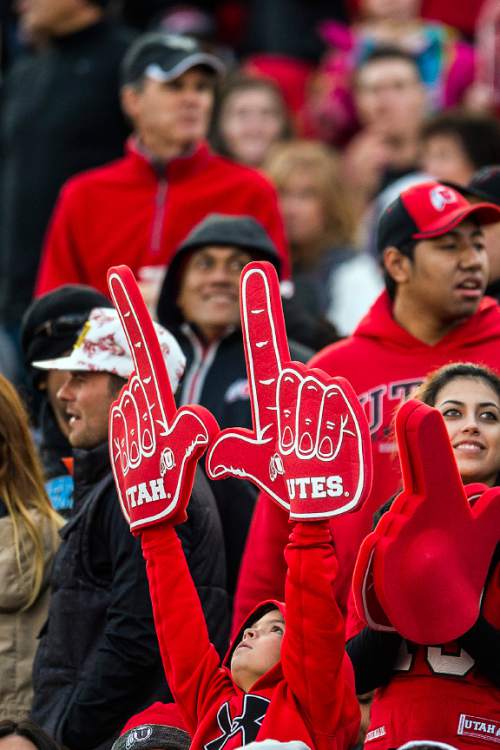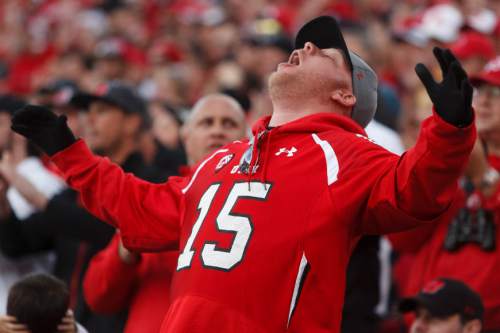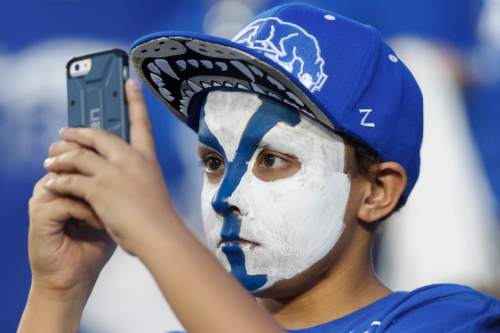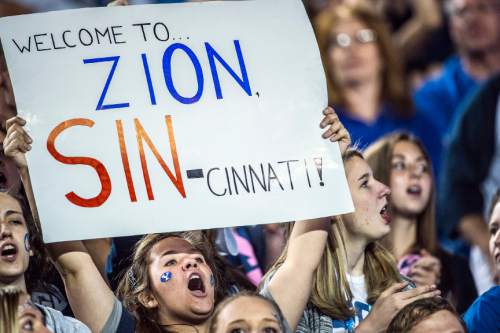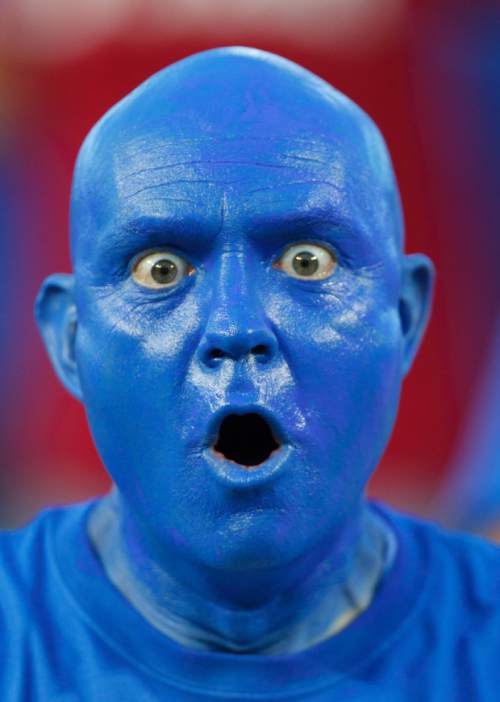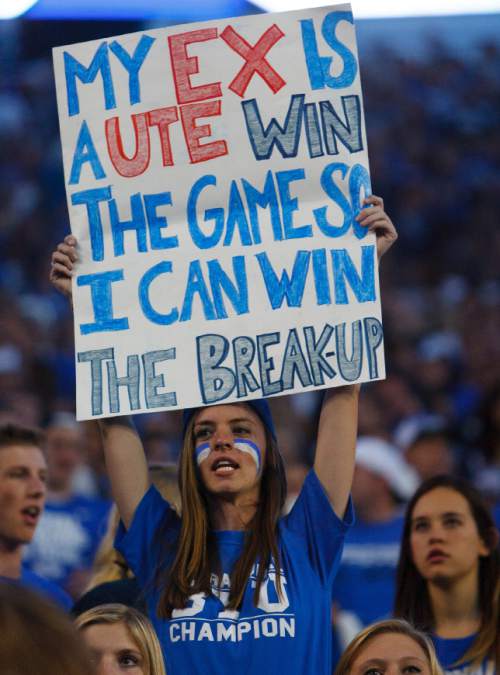This is an archived article that was published on sltrib.com in 2015, and information in the article may be outdated. It is provided only for personal research purposes and may not be reprinted.
Prior to the kickoff of the Utah-Arizona State game a week ago, a man drove a pickup truck toward Rice-Eccles Stadium. Not just any pickup truck. A pickup truck that had five prominent Ute stickers on the back, of varying sizes and designs, identifying him as a Utah man, a Utah fan, 'til he dies. He also had a Ute logo on a boat trailer-hitch plug, as well as two Ute flags flying high and proud, one out each window, as though Utah football was some sort of breakaway republic.
Who knows, maybe it is.
He was beyond proud of his display, his devotion to and his citizenship in LUFF, the Land of Ute Football Fanaticism.
The logical mind might wonder: What the hell's wrong with this guy?
Probably the same ailment that afflicts the BYU fan who paints one half of his head blue and the other half white and wears a goofy-looking Cougar beanie, along with a bedazzled jersey with five different necklaces of mini-stuffed-Cougars strung around his neck and the Florida State fan whose house has a leaky roof and walls with paint flaking off, but he uses his hard-earned cash instead for season tickets.
And there's the Alabama fan whose body is covered in tattoos dedicated to the Crimson Tide, one of which on his arm is a quote by Bear Bryant that reads: "The truth of all things: 'If you believe in yourself, have dedication and pride, and never quit, you'll be a winner. The price of victory is high, but so are the rewards,'" and another tat on his back, a full-blown portrait of the Bear leaning against a goalpost, wearing his famous houndstooth hat, looking up to the heavens. Then, there's the Ohio State fan who a few years ago named his son "Tressel," after the Buckeye head coach, who later resigned when a scandal hit the program.
Oops.
A lot of sports fans in this country have a little nut-job in them, but college football fans are the closest thing the United States has to European soccer fans. Generally, they don't riot in the stands, with mobs beating up groups of visiting fans and drinking beer stands dry before kicking them over, but they seem to be extremely … what's the word, passionate?
More than any other American sport, college football causes a serious kind of connection from school to fan that often blows past the line of "normal" rooting interest and charges straight into clinical fanaticism. There have been academic studies and papers and books written on this topic, discussing the phenomenon's psychology, covering everything from individuals looking for a sense of belonging to people attaching their self-esteem to the success of their school's team to people searching for a fix for the failures in other parts of their lives to folks just looking to have a good time and feel better about themselves.
The over-the-top Alabama fan would know that it was Bryant who, when asked about the benefits of having football as a part of the college experience, infamously growled: "It's kinda hard to rally around a math class."
Often, almost always, the connecting process spills over to the emotional. People act and behave at a CFB game, or even watching on television, differently than they ever do at any other time: The reserved scream and yell, the impartial see things through colored lenses, the pious utter words that rhyme with fool-spit and brother-trucker.
Some studies show that identifying with a team is healthy, others reveal that it's more healthy when your team wins, and most healthy when it's kept in perspective. Researchers have found, for instance, that fans eat less-fatty foods after a win and more-fatty foods after a loss.
Everybody's looking for some reinforcement, some comfort.
The terms BIRGing and CORFing — basking in reflected glory and cutting off reflected failure — in sports psychology are now famous. Fans want to be associated with a winner and they want to distance themselves from losing. They wrap themselves in the identity of the team and do what they have to do to deal with the extremes.
A cultural anthropologist told me that fans — particularly college fans, especially alums of schools — see their sports teams as feudal armies going off to do battle, representing them, against other armies representing other city-states, and this is modern, more civilized society's way of seeking the spoils of victory.
Sometimes, though, it's uncivilized, as is evidenced by the way some empty souls — enhanced by anonymous keyboard courage — from rival schools interact on websites and via social media. My guys are good, your guys are bad.
Sports psychologist Ron Chamberlain once confirmed that fans really do — to different degrees of intensity — identify with the schools for which they root, especially when those teams win. That's why fans of successful college football teams spend their money to wear jerseys and T-shirts and hats and other gear that identifies not just the team itself, but them, too, as winners. Even when those teams generally lose, Chamberlain said fans find optimism in whatever might come next time around. "It opens the door of possibility to do hard things in our own lives," he said. "… It shows us the power of dreaming big, believing in ourselves, being resilient."
From week to week, from season to season, whether you bask or cut off, then, it's best to keep it under control, best to keep it from taking over your car, your body, your self-esteem, your identity, your world, your life.
Which is to say, don't name your next kid Whitt or Bronco because … you're never sure how the story will end. Bear, though, is all good, it's all yours.
GORDON MONSON hosts "The Big Show" with Spence Checketts weekdays from 3-7 p.m. on 97.5 FM and 1280 AM The Zone. Twitter: @GordonMonson.


